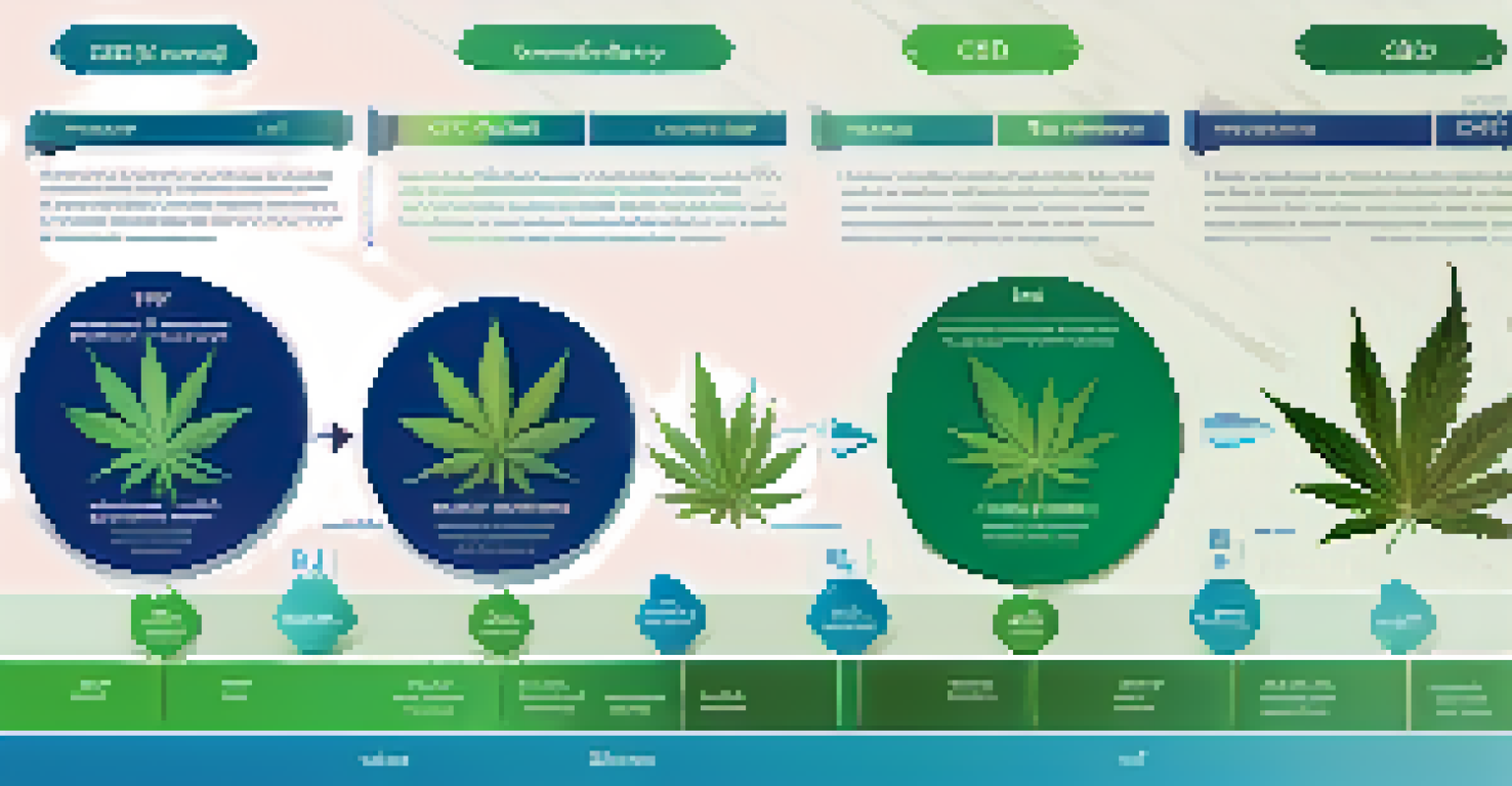The Ethics of Marketing Marijuana Products to Consumers

Understanding the Legal Landscape of Marijuana Marketing
The legal status of marijuana varies widely across different regions, which creates a complex framework for marketing. In some places, marijuana is fully legal for recreational and medicinal use, while in others, it's still prohibited. This patchwork of laws means that marketers must navigate a landscape that can change rapidly, making it crucial to stay informed about local regulations.
Marketing is no longer about the stuff you make but about the stories you tell.
Understanding the legal framework is not just about compliance; it also impacts how products can be marketed. For example, in states where marijuana is legal, advertising restrictions might limit how and where companies can promote their products. This requires marketers to be innovative while ensuring they respect the law, which can lead to ethical dilemmas if regulations are ambiguous.
Moreover, adhering to legal standards helps build consumer trust. If consumers see that a brand prioritizes legality and ethics in its marketing practices, they may feel more comfortable purchasing those products. This trust is essential in an industry that still faces stigma and skepticism from the broader public.
Targeting the Right Audience: Who Should Consume Marijuana?
When marketing marijuana products, identifying the target audience is critical. This involves understanding who benefits from these products, such as medical users seeking relief from chronic pain or recreational users looking for relaxation. However, ethical marketing must also consider who should not be targeted, such as minors or individuals with a history of substance abuse.

There’s an inherent responsibility in how marketers approach their audience. Targeting vulnerable populations, either directly or indirectly, raises ethical concerns. For instance, promoting high-THC products to young adults can lead to potential misuse and health issues, creating a fine line that marketers must navigate carefully.
Legal Compliance is Key
Marketers must stay informed about varying marijuana laws to ensure compliance and build consumer trust.
By focusing on responsible target demographics and transparent messaging, brands can foster a positive image while promoting safe consumption. This approach not only enhances brand loyalty but also aligns with the broader goal of public health and safety.
Transparency: The Foundation of Ethical Marketing Practices
Transparency in marketing is vital, especially in an industry like marijuana, where misinformation can easily spread. Brands should clearly communicate the ingredients, effects, and potential side effects of their products. This openness helps consumers make informed decisions and builds trust between the brand and its audience.
The best marketing doesn't feel like marketing.
Additionally, transparency extends to sourcing and production practices. Consumers increasingly want to know where their products come from and how they are made. Companies that openly share their cultivation and manufacturing processes not only comply with ethical standards but also appeal to consumers who value sustainability and ethical business practices.
By prioritizing transparency, brands can differentiate themselves in a crowded market. This commitment not only attracts conscientious consumers but also establishes a reputation for integrity, which is invaluable in the long run.
Avoiding Misleading Claims in Marketing Strategies
Misleading claims can severely tarnish a brand's reputation and mislead consumers. In the marijuana industry, this can happen when companies exaggerate the benefits of their products or downplay potential risks. Ethical marketing requires that all claims be backed by scientific evidence, ensuring consumers receive accurate information.
For instance, claiming that a product can cure serious illnesses without proper scientific backing not only misleads consumers but may also have legal repercussions. It erodes trust in the entire industry and can lead to increased scrutiny from regulators. Therefore, brands must be diligent in their messaging and ensure they are not only compliant but honest.
Target Audience Responsibility
Identifying and ethically targeting the right demographics is crucial to avoid potential misuse and promote safe consumption.
By avoiding misleading claims, brands can foster a culture of honesty and accountability. This not only protects consumers but also reinforces the brand's commitment to ethical standards, ultimately benefiting the industry as a whole.
The Role of Education in Ethical Marijuana Marketing
Education plays a crucial role in ethical marketing, particularly in an industry filled with misconceptions and stigma. Marketers should prioritize educating consumers about the responsible use of marijuana, its effects, and the differences between various products. This not only enhances the consumer experience but also promotes public health.
Offering educational resources, such as guides on dosage or the differences between THC and CBD, can empower consumers to make informed choices. Additionally, hosting workshops or seminars can provide a platform for open discussions about marijuana use, helping to demystify the product.
By positioning themselves as educators rather than just sellers, brands can cultivate a loyal customer base that trusts their expertise. This approach not only supports ethical marketing but also contributes to a more informed and responsible consumer culture.
Social Responsibility: Giving Back to Communities
Incorporating social responsibility into marketing strategies can enhance a brand's ethical standing. This can involve supporting local communities affected by the war on drugs or investing in educational programs about responsible consumption. By actively contributing to societal well-being, brands can create a positive impact while improving their public image.
Moreover, brands can engage in partnerships with organizations that promote drug education, addiction recovery, or social equity in the cannabis industry. Such collaborations not only align with ethical values but also show consumers that the brand cares about more than just profit.
Education Enhances Consumer Trust
Providing educational resources empowers consumers to make informed choices and fosters a responsible consumer culture.
Ultimately, by integrating social responsibility into marketing efforts, brands can foster goodwill and loyalty among consumers. This not only enhances brand reputation but also contributes to the overall health of the industry and community.
Navigating the Stigma Surrounding Marijuana Products
Despite increasing legalization, stigma surrounding marijuana remains a significant challenge. Marketers must navigate this stigma thoughtfully, ensuring they present their products in a way that promotes acceptance and understanding. This requires a delicate balance between appealing to consumers and addressing societal concerns.
Using positive narratives and focusing on the benefits of responsible consumption can help reshape perceptions. For example, highlighting stories of medical users who have found relief can create empathy and understanding among skeptical audiences. This storytelling approach can humanize the product and foster connections.

By addressing stigma head-on and promoting a positive dialogue, brands can not only engage consumers but also contribute to a broader cultural shift. This is essential for the long-term growth and acceptance of the marijuana industry.